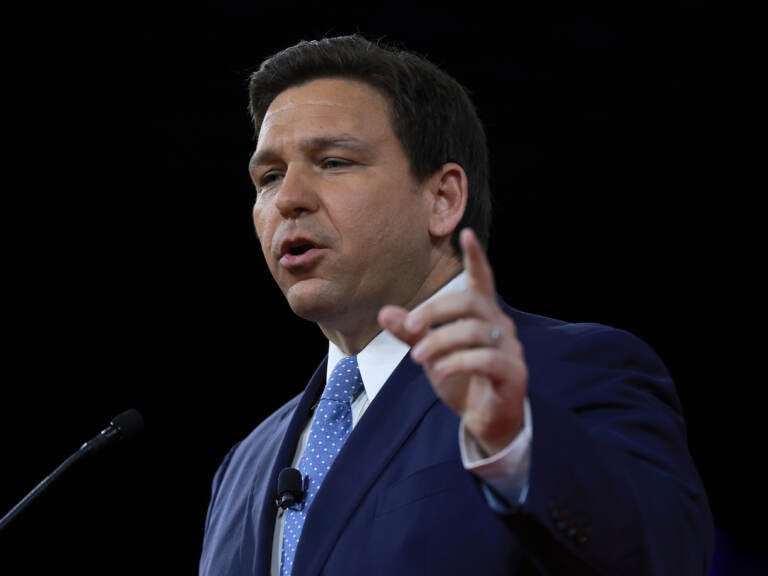Florida’s governor signs controversial law opponents dubbed ‘Don’t Say Gay’

Florida Gov. Ron DeSantis, seen here on Feb. 24, signed a bill into law Monday that restricts the education of LGBTQ topics in the state's public schools. (Joe Raedle/Getty Images via NPR)
Public school teachers in Florida are banned from holding classroom instruction about sexual orientation or gender identity after Florida’s Gov. Ron DeSantis, a Republican, signed the controversial “Parental Rights in Education” bill.
The bill, which some opponents have called “Don’t Say Gay,” was signed by DeSantis on Monday. It reads, “A school district may not encourage classroom discussion about sexual orientation or gender identity in primary grade levels.”
Supporters of the legislation say it’s meant to allow parents to determine when and in what way to introduce LGBTQ topics to their children. It also gives parents an option to sue a school district if the policy is violated.
During a press conference ahead of signing the law, DeSantis said teaching kindergarten-aged kids that “they can be whatever they want to be” was “inappropriate” for children.
He said, “It’s not something that’s appropriate for any place, but especially not in Florida.”
The “Don’t Say Gay” moniker comes from critics of the measure who blast this idea and insist this policy will hurt LGBTQ children.
DeSantis and other supporters gathered for the bill signing called this messaging “sloganeering” and referred to efforts to educate students about LGBTQ issues as part of “woke gender ideology.”
DeSantis remains defiant in the face of criticism
Studies have shown that LGBTQ youth already face higher health and suicide risks than their cisgender or straight peers. When those kids are given access to spaces that affirm their gender identity, they report lower rates of suicide attempts, according to The Trevor Project.
The Trevor Project condemned the signing of the bill saying the bill erases “LGBTQ identity, history, and culture — as well as LGBTQ students themselves.”
The group also critiqued the policy’s parental notification requirements. The law requires parents to be the first to be notified of any health or support services offered to their kids in school and allows them the chance to deny those services on behalf of their children.
The Trevor Project says these provisions, “appear to undermine LGBTQ support in schools and include vague parental notification requirements, which could effectively require teachers to ‘out’ LGBTQ students to their legal guardians without their consent, regardless of whether they are supportive.”
Amit Paley, CEO & Executive Director of The Trevor Project, said in a statement that, “While I am saddened to see this harmful bill signed into law, I am inspired by the outpouring of support for LGBTQ students we have seen from parents, teachers, celebrities, and their peers. Social support is vital for suicide prevention, and I want to remind LGBTQ youth in Florida and across the country that you are not alone.”
Leading up to the bill’s signing, critics, which include The Walt Disney Company, lambasted Florida lawmakers for the legislation.
On Monday, a spokesperson said in a statement that the company hopes the law is repealed or struck down in court.
“Florida’s HB 1557, also known as the ‘Don’t Say Gay’ bill, should never have passed and should never have been signed into law,” the statement read. “Our goal as a company is for this law to be repealed by the legislature or struck down in the courts, and we remain committed to supporting the national and state organizations working to achieve that.”
But DeSantis was defiant in the face of critics, “I don’t care what Hollywood says. I don’t care what big corporations say. Here I stand. I am not backing down.” The law takes effect July 1.
The legislation was also the target of jokes at Sunday night’s Academy Awards ceremony.



